Articles about reggae music, reviews, interviews, reports and more...
Interview: Toussaint
- Home
- Articles
- Interviews
- Interview: Toussaint

Interview: Toussaint
"This is not a joke for me, this music is really real for me. And the things that people are singing about, I’ve actually lived."
Sampler
Toussaint is emerging as a standout voice in reggae for the blend of gospel and roots music on his debut solo album 'Black Gold'. Hailing from a long musical past; from a childhood steeped in church and gospel, through subway sessions and stints with jazz-funk fusion projects, he seems to have finally found his niche with the beacon of Virgin Islands reggae, I Grade Records. After a very well received performance at San Francisco’s Rockit Room, Jessica Dore sat down to conduct a brief interview with Toussaint to enhance her review of the show that turned into an easy Sunday morning conversation about everything from the story behind his name, the hunt for Laurent “Tippy” Alfred (and the fabulous results) and a few of the reasons behind why the artiste can’t stop smiling.
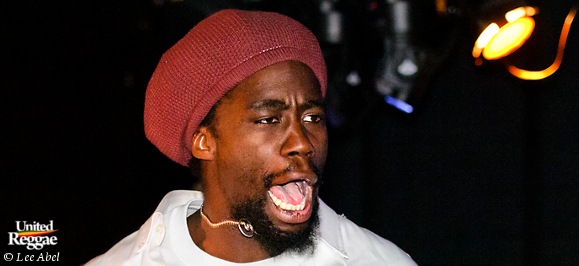
You’re bringing your own unique vibe to the reggae community with a soul connection. What’s your background and upbringing with music?
Well I grew up in church. My dad’s a minister and my mom’s a singer. And we used to travel around; me and my three siblings. And we would travel around and we would sing. My dad would preach and you know, we were pretty much constantly on tour when I was little because we were in church eight days a week. It was pretty sheltered; gospel and soul, Marvin Gaye, Donnie Hathaway and, you know, that kind of stuff. And, by the time I got to high school I was sneaking out to get my hip-hop fix and you know, listening to Wu-Tang Clan and all the East Coast rap I was really into. I started a band in college. And I left college early because I wanted to do music, and then I left and came to Boston in 2001. And I just started playing. I quickly got involved in the scene out there and was playing everything from reggae, to funk, to Fela Kuti cover bands to, just whatever could keep me working. I established relationships along the way of course, and I started with my own unit in 2003. And after that I went on to play with Soulive, recorded a record with them, and then now I’m here.
And what are you listening to now?
I’m listening to Tarrus Riley a little bit, but mostly dealing with the Virgin Islands roots scene right now. There’s so much to discover there and right now it is so blessed to be a part of one of the fastest growing musical movements. I love Pressure. I love Queen Omega. Diggin’ Dezarie, Ras Batch. There’s just so much, so I’ve been digging through and figuring it out. Really enjoying that right now.
How’d you come to take your name Toussaint?
Yeah, he was respected and known as the father of Haiti. Toussaint L’Ouverture and his story is a really interesting story, because he was very pragmatic. 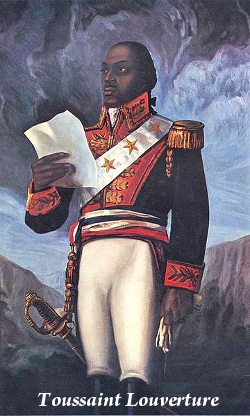 He wasn’t a reactionary type cat, he always looked at the whole picture. And then he’s known for being a master strategist. He just outmaneuvered all of the French generals, the Spanish generals, the British generals, he fought three different colonial powers during his time. And yeah, I took that name because everybody else was naming themselves after…During what I like to call the Golden Era of hip-hop, you had these rappers coming out with names like Capone and Gotti and, just ignorant shit like that. So I decided that I would pay some homage to someone from the Diaspora that was, you know, that made a contribution. Which, we have so many. So it’s crazy that you have to choose some white Italian, you know. Even Biggie Smalls, he was an icon at that time and even him, his alias was Frank White. And Frank White was a fictional character, a white guy from a movie! [Laughing] I mean, whatever, it’s so crazy, it’s so weird. So anyway, that was the thought process behind it.
He wasn’t a reactionary type cat, he always looked at the whole picture. And then he’s known for being a master strategist. He just outmaneuvered all of the French generals, the Spanish generals, the British generals, he fought three different colonial powers during his time. And yeah, I took that name because everybody else was naming themselves after…During what I like to call the Golden Era of hip-hop, you had these rappers coming out with names like Capone and Gotti and, just ignorant shit like that. So I decided that I would pay some homage to someone from the Diaspora that was, you know, that made a contribution. Which, we have so many. So it’s crazy that you have to choose some white Italian, you know. Even Biggie Smalls, he was an icon at that time and even him, his alias was Frank White. And Frank White was a fictional character, a white guy from a movie! [Laughing] I mean, whatever, it’s so crazy, it’s so weird. So anyway, that was the thought process behind it.
 I took that name [Toussaint] because everybody else was naming themselves after…During what I like to call the Golden Era of hip-hop, you had these rappers coming out with names like Capone and Gotti and, just ignorant shit like that. So I decided that I would pay some homage to someone from the Diaspora that was, you know, that made a contribution. Which, we have so many.
I took that name [Toussaint] because everybody else was naming themselves after…During what I like to call the Golden Era of hip-hop, you had these rappers coming out with names like Capone and Gotti and, just ignorant shit like that. So I decided that I would pay some homage to someone from the Diaspora that was, you know, that made a contribution. Which, we have so many.
Have you always had a connection with reggae and Caribbean culture?
I definitely always had a connection with my heritage and my roots and my culture. And I think it’s actually kind of funny because everybody asks me where I’m from, who I am. I say [I’m from] Indiana, and they say, “so where your parents from?” Well my mom’s from Mississippi and my dad’s from Indianapolis. It’s so crazy, in conversation, to think about where you’re from. Anyway, black Americans are always the last ones to be thinking about culture, and thinking about their roots. We’ve been separated from it so much. But, the way that I kind of linked up with the guys down in the Virgin Islands is that there’s this small-time promoter out of the northeast, and he goes down. 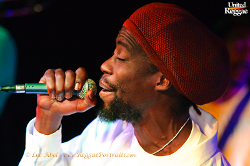 His goal is to live in the Virgin Islands during the winter, so what he does is he puts together these little tours and he brings bands down from the Northeast down to the Virgin Islands. It’s not really like a get rich scheme, you know, getting paid very much. You practically end up losing money if you’re not careful. But at the time, when I first did it, it was after I’d played with Soulive for a while, and after that I was kinda down for awhile and this was the first time I came back out to play shows. So I went and did that and didn’t meet Tippy the first time around, I mean, I met him, I met his father. Which was funny, his father was like, “you know my son does music,” but I didn’t get a chance to meet Tippy. And so this next time they called me to do this tour again I actually said no initially, and then I thought about it and I was like, “well, maybe I could run into Tippy when I get down there” so I did do it. And I ran him down, and we went to the studio to do two songs and it ended up being four nights and four days. And after that we had eleven tracks, which is the majority of the record [Black Gold]. So, we recorded eleven tracks in four days. It was pretty manic. Neither one of us slept. We just cranked it out, and then I came back down with my family later in the year, recorded four more tunes and shot the video [Be You].
His goal is to live in the Virgin Islands during the winter, so what he does is he puts together these little tours and he brings bands down from the Northeast down to the Virgin Islands. It’s not really like a get rich scheme, you know, getting paid very much. You practically end up losing money if you’re not careful. But at the time, when I first did it, it was after I’d played with Soulive for a while, and after that I was kinda down for awhile and this was the first time I came back out to play shows. So I went and did that and didn’t meet Tippy the first time around, I mean, I met him, I met his father. Which was funny, his father was like, “you know my son does music,” but I didn’t get a chance to meet Tippy. And so this next time they called me to do this tour again I actually said no initially, and then I thought about it and I was like, “well, maybe I could run into Tippy when I get down there” so I did do it. And I ran him down, and we went to the studio to do two songs and it ended up being four nights and four days. And after that we had eleven tracks, which is the majority of the record [Black Gold]. So, we recorded eleven tracks in four days. It was pretty manic. Neither one of us slept. We just cranked it out, and then I came back down with my family later in the year, recorded four more tunes and shot the video [Be You].
 I went to the studio with Tippy to do two songs and it ended up being four nights and four days. And after that we had eleven tracks, which is the majority of the record [Black Gold].
I went to the studio with Tippy to do two songs and it ended up being four nights and four days. And after that we had eleven tracks, which is the majority of the record [Black Gold].
So, tell me about the album, about 'Black Gold'.
Well, in the song Black Gold I say, “The faces I see, staring at me, in Grandma’s collection of pictures, a treasure trove to behold, nuggets of gold, because their life is the reason for my existence” and that’s kind of the concept. 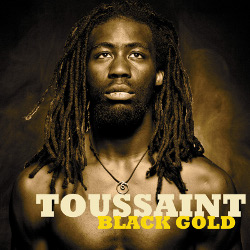 Thinking about our history. Thinking about our heritage, and our culture, our family members; immediate family members, and just humanity, our family members. And people that were able to stand in the face of adversity and actually triumph in the face of adversity. And those people that were not able to do so. The coping mechanisms that were good and bad. All of those things are there, and those are the tools that I have to approach whatever obstacles that I have in front of me. And we’re always told over and over that we’re worth nothing, that we’re lazy, this that and the third, there’s a whole slew of stereotypes and ideas that have been presented over time that are meant to beat us down, that are actually intended to beat us down so that we don’t think that we’re worth anything. So, it’s a meditation to remind us that we have treasure troves of gold.
Thinking about our history. Thinking about our heritage, and our culture, our family members; immediate family members, and just humanity, our family members. And people that were able to stand in the face of adversity and actually triumph in the face of adversity. And those people that were not able to do so. The coping mechanisms that were good and bad. All of those things are there, and those are the tools that I have to approach whatever obstacles that I have in front of me. And we’re always told over and over that we’re worth nothing, that we’re lazy, this that and the third, there’s a whole slew of stereotypes and ideas that have been presented over time that are meant to beat us down, that are actually intended to beat us down so that we don’t think that we’re worth anything. So, it’s a meditation to remind us that we have treasure troves of gold.
 It’s a meditation to remind us that we have treasure troves of gold.
It’s a meditation to remind us that we have treasure troves of gold.
Damn, did you rehearse that before I called you?
No! I didn’t rehearse it, but it’s been beautiful for me. This has been an explosion, this has been something I’ve been working for for a long time. It’s really funny because people are just now hearing about me and my music on a large, large scale, but the reality is I’m far from a rookie, I’ve been doing this for a really long time. So, right now it’s like, I’ve been exploding. I’ve always wanted to write and so these ideas I’ve definitely had time to formulate and flesh out.
Yeah, you do seem deliberate and focused on what you’re presenting, as opposed to artists who are breaking through earlier in their careers that aren’t really sure yet what they want to present.
That’s why it’s such a blessing right now, sis. Because the reality is that I’ve been touring for ten years with no record. With no support, with no label. Just me. Showing up with burnt CDs saying, “here I am, my name is Toussaint, I have CDs.” There was a time when I’d play on the street in Harvard Square for eight hours and then go do a show. I was playing in New York on the subway for hours and hours. So this is not a joke for me, this music is really, really real for me. And the things that people are singing about, I’ve actually lived. To a fault at some points, you know, because I’ve walked away from everything else except music, and I was like, I know this is going to support me. I know I’m not eating really well right now, and I’m sleeping on someone’s couch, but I know that this diligence is going to pay off. And so, right now I’m just grateful. I’m just so blessed to be working with like minded people and I’ve spent so much time fighting people, trying to get them to understand where I’m coming from, working with people that don’t even understand the lyrics that I’m singing about. And so, I don’t have that now. I have a brotherhood behind me so it feels, it feels, it feels really, really blessed. And so, it makes me want to be focused even more because I’ve never been the guy that wanted to be presented as just some fluff artist, or just somebody who’s just playing around with music. Because it’s not my intention at all, I’m not trying to play a game. I really think it’s important for us to use whatever little light that we have to bring some justice, and some peace. And that’s what I was trying to do.
 I really think it’s important for us to use whatever little light that we have to bring some justice, and some peace. And that’s what I was trying to do.
I really think it’s important for us to use whatever little light that we have to bring some justice, and some peace. And that’s what I was trying to do.
Your gratitude and attitude are definitely coming through. Seeing you perform on Thursday, I was going through my pictures and in every one you looked like you’d just won the lottery.
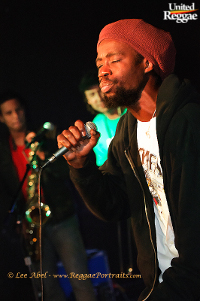 It’s just something that’s incredible. And you have to love what you do. And when you work as hard as I have for it, and you have a special, special love for it, you can’t get jaded. I’ve just worked too hard for it. And I honestly think, out of most of the performers, besides maybe Ozomatli that were on the bill yesterday [at NWWMF] I think I’ve honestly played more shows than all of them. Because for me, when I’m not on the festival circuit, I’m at home playing three, and four, and five times a week. That’s all I do is play music, and I have to eat. You know what I mean? So. I’ve been doing this for fifteen years; just playing, and playing, and playing and playing. So finally to have the people, to work with the people that understand, it’s a beautiful thing. It seems like there’s a good response right now.
It’s just something that’s incredible. And you have to love what you do. And when you work as hard as I have for it, and you have a special, special love for it, you can’t get jaded. I’ve just worked too hard for it. And I honestly think, out of most of the performers, besides maybe Ozomatli that were on the bill yesterday [at NWWMF] I think I’ve honestly played more shows than all of them. Because for me, when I’m not on the festival circuit, I’m at home playing three, and four, and five times a week. That’s all I do is play music, and I have to eat. You know what I mean? So. I’ve been doing this for fifteen years; just playing, and playing, and playing and playing. So finally to have the people, to work with the people that understand, it’s a beautiful thing. It seems like there’s a good response right now.
 Finally to have the people, to work with the people that understand, it’s a beautiful thing.
Finally to have the people, to work with the people that understand, it’s a beautiful thing.
Let’s talk about the connection between the Bay Area, New York and the northeast with Jahdan and Lustre Kings and those guys.
[Laughing] Ohhhhh man. You know what? Jahdan is like my brother. It’s so funny, the different people within my circle now, I’ve met in different times. The trombone player, Balboa, I was in the studio with Tippy, recording this record and he was like “This song really needs some horns, I gotta call my man Balboa.” And I’m like, “wait a minute, Balboa Becker?” You know what I mean? And then same thing with Jahdan and Moon, I met them before I met Tippy, I didn’t realize it was such a family thing. Yeah, Jahdan and I, Jahdan was staying by Geko [Jones] and he was like “come on man, I’m going over here, come stay by here.” So he was stayin’ by somebody and he brought me to come stay too. [Laughs] it was pretty funny! So yeah, we’re all a big family. Actually, Moon [Andrew Bain, Lustre Kings] produced a couple of the tracks on the record. The straight-up soul track on the record, “Unforgettable,” was produced by him.
It’s really exciting to see these connections, this triangle, everybody just mixing and mingling and the amazing projects that are coming out of it.
Yeah, the thing is right now is a really blessed time. There’s this convergence that’s going on right now. All the bredren that I know, and the sistren, I don’t mean to leave the sistren out, but all the artists that I know that have been doing this for years, and struggling, being at the level of working musicians for so long, are now taking the strides, have sharpened and honed in our their crafts, and are taking the strides to get to the next level. 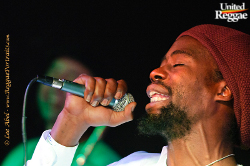 And actually making the next level. Making what the next level is. It’s a very beautiful thing to see happening. Jahdan is definitely one of the premier minds in making reggae music right now. And all the people, that’s what I mean. That’s why you see such joy from me, because my whole circle, not like one or two cats, my whole circle, they’re all very, very irie individuals that are striving, and we’re all reaching for the same thing. We’re trying to bring this conscious music to such a critical mass that, you know, it has to be recognized. It has to be dealt with. And you know, we don’t have to sell out per se, or whatever that is. People have misconceptions about what that means. But we can still do it Jah way. We can still do it together. And we’re doing it. And that’s why it’s such an invigorating thing just to see it happen. Like your dreams becoming reality right in front of your eyes.
And actually making the next level. Making what the next level is. It’s a very beautiful thing to see happening. Jahdan is definitely one of the premier minds in making reggae music right now. And all the people, that’s what I mean. That’s why you see such joy from me, because my whole circle, not like one or two cats, my whole circle, they’re all very, very irie individuals that are striving, and we’re all reaching for the same thing. We’re trying to bring this conscious music to such a critical mass that, you know, it has to be recognized. It has to be dealt with. And you know, we don’t have to sell out per se, or whatever that is. People have misconceptions about what that means. But we can still do it Jah way. We can still do it together. And we’re doing it. And that’s why it’s such an invigorating thing just to see it happen. Like your dreams becoming reality right in front of your eyes.
 We’re trying to bring this conscious music to such a critical mass that, you know, it has to be recognized. It has to be dealt with. And you know, we don’t have to sell out per se, or whatever that is. People have misconceptions about what that means. But we can still do it Jah way.
We’re trying to bring this conscious music to such a critical mass that, you know, it has to be recognized. It has to be dealt with. And you know, we don’t have to sell out per se, or whatever that is. People have misconceptions about what that means. But we can still do it Jah way.
And good for the reggae community too. It’s great to have people who are making reggae and other Caribbean music who maybe weren’t born in Jamaica, didn’t grow up in the islands, but people who are still bringing something to the table.
Well you know what, that’s one of the things that I wanted to point out about this tour. You’ve heard all these people for years talking about Diaspora, pan-Africanism, and these kinds of concepts. And this is something that people have kind of lost contact with. But on this tour, we have Jamaica represented. St. Thomas is represented. The states are represented. St. Croix is represented. We’re all here, we’ve all come together and people are feeling that unity. They’re feeling that. And it’s just something you don’t see. It’s a shame too, you know. Within the African community, within the Diaspora, there is constant tension between African Americans and African Caribbeans. 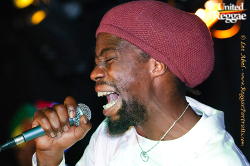 The Jamaicans feel like they’re better or the Haitians feel like they’re better than us, state-side. And then the Africans don’t want to deal with any of us! You know what I mean? It’s such a weird dynamic and it’s something that I can say to you, knowing that you’re writing this story, because it’s actually real. It’s something that actually exists and we’re battling constantly. And so, when we’re strategizing and trying to figure out how to market what we’re doing and how to reach out to people, these are things that we have to think about, these tensions that exist. And so, it’s even more blessed because what we have in our midst is a representation of unity between some groups of people that have historically been at each other’s throats, and made to be that way. We have a choice, everybody has a choice at the end of the day, so I don’t want to make it like there’s an excuse. But there are a lot of forces that have helped to mold that reality. So, that’s just why it’s so necessary for us to be conscious about the way we’re moving. It’s really a constant war. It’s a war when you walk out of your door, so you gotta be ready to face whatever it is. Especially once you start doing some good, that’s when you really gotta be focused because you’re gonna see some stuff on a scale that you’ve never seen before. Temptation you’ve never seen before. So, meditation is so key to our walk.
The Jamaicans feel like they’re better or the Haitians feel like they’re better than us, state-side. And then the Africans don’t want to deal with any of us! You know what I mean? It’s such a weird dynamic and it’s something that I can say to you, knowing that you’re writing this story, because it’s actually real. It’s something that actually exists and we’re battling constantly. And so, when we’re strategizing and trying to figure out how to market what we’re doing and how to reach out to people, these are things that we have to think about, these tensions that exist. And so, it’s even more blessed because what we have in our midst is a representation of unity between some groups of people that have historically been at each other’s throats, and made to be that way. We have a choice, everybody has a choice at the end of the day, so I don’t want to make it like there’s an excuse. But there are a lot of forces that have helped to mold that reality. So, that’s just why it’s so necessary for us to be conscious about the way we’re moving. It’s really a constant war. It’s a war when you walk out of your door, so you gotta be ready to face whatever it is. Especially once you start doing some good, that’s when you really gotta be focused because you’re gonna see some stuff on a scale that you’ve never seen before. Temptation you’ve never seen before. So, meditation is so key to our walk.
 What we have in our midst is a representation of unity between some groups of people that have historically been at each other’s throats, and made to be that way.
What we have in our midst is a representation of unity between some groups of people that have historically been at each other’s throats, and made to be that way.
Photos copyright Lee Abel 2010 - Toussaint in San Francisco - August 12, 2010
Reproduction without permission of United Reggae and Lee Abel is prohibited.
Read more about this topic
Read comments (1)
| Posted by Don Julian on 09.02.2010 | |
| This is a great interview! Very informative, illustrative and interesting too. ;) It makes me want to check out Toussaints music. Kudos to both interviewer and interviewed. Peace, Don Julian |
|
Comments actually desactivated due to too much spams
Browse by categories
Recommended Articles
Latest articles
Recently addedView all
© 2007-2025 United Reggae. All Rights Reserved. Reproduction in whole or in part is prohibited. Read about copyright
Terms of use | About us | Contact us | Authors | Newsletter | A-Z














